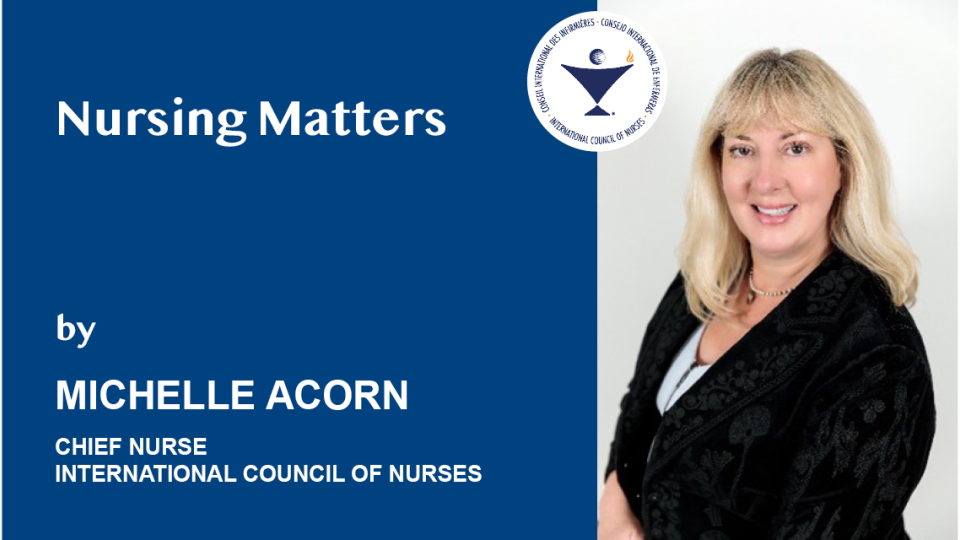Chief Nurse Blog: Nursing Matters March 2022

Respecting patients is of global importance!
As a caring scientific profession, nearly 28 million nurses around the world respect and partner with health care consumers and patients. They advocate, educate and deliver nursing services across populations and health and care social sectors, optimising access for global health and the sustainable development goals. Patient roles in health care are shifting and transforming, and fostering therapeutic relationships with nurses and interprofessional teams.
We are all patients at one time across our lifespans, nurses included. Nurses consistently top public polls as highly trusted professionals. Nurses improve the lives of patients around the globe, partnering with them, speaking with them or on their behalf. Empowering and enabling people to raise their voices for safe and high quality healthcare is paramount.
ICN is the global voice for nurses. Nurses continue demonstrating during the COVID 19 pandemic, in disaster and humanitarian crisis, and through partnering with patients in health and social services. Listening to patients, and involving them in decision making, in policies, patient safety, and on boards and committees is key to inform models of care design, service delivery, inclusion and diversity.
Patients and nurses share a motto, nothing about us without us. Nurses and patients can unite to share health journeys in powerful partnerships with valued personal and health system impacts. Reciprocity is demonstrated daily. Nurses advocate for patients and patients are strong advocates of nursing. A number of studies about the relationship between nurses, patients and outcomes exist.
The need for nursing is universal. The modernised ICN Code of Ethics for Nurse (2021) https://www.icn.ch/system/files/2021-10/ICN_Code-of-Ethics_EN_Web_0.pdf highlights one of four principal elements related to nurses and patients, or people requiring care or services. Nurses’ primary professional responsibility is to people requiring care now or in the future, whether individuals, families, communities or populations. Nurses promote an environment in which the human rights, values, customs, religious and spiritual beliefs are acknowledged and respected. Nurses ensure people receive understandable, accurate, sufficient and timely information in a manner appropriate to the patient’s culture, linguistic, cognitive and physical needs, and psychological state. Nurses respect the privacy, confidentiality and the interests of patients. Nurses advocate for equity and social justice across all practice settings, including hospital, home and community care, primary care, public health, population health, long term care, correctional care, academic institutions and government. Nurses provide evidence-informed, person-centred care, using the values and principles of primary health care and health promotion across the lifespan.
The WHO Global Strategy on Integrated People-Centered Care (2015) is another key resource. https://interprofessional.global/wp-content/uploads/2019/11/WHO-2015-Global-strategy-on-integrated-people-centred-health-services-2016-2026.pdf People-centred care is an approach that adopts individual, carers, families and community perspectives as participants in, and beneficiaries of, trusted health systems that respond to their needs and preferences in humane and holistic ways. People-centred care requires the education and support needed to make decisions and participate in their own care. It is organised around the health needs and expectations of people rather than diseases. Strategies include empowering and engaging people, strengthening participatory governance and accountability, reorienting models of care, coordinating services, and creating enabling environments that includes patient reported outcomes.
Patients’ and nurses’ voices matter. They are powerful, informed, influential and must be respected.
ICN Chief Nurse, Dr. Michelle Acorn, DNP, NP PHC/Adult, CGNC, FCAN, FAAN